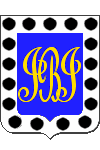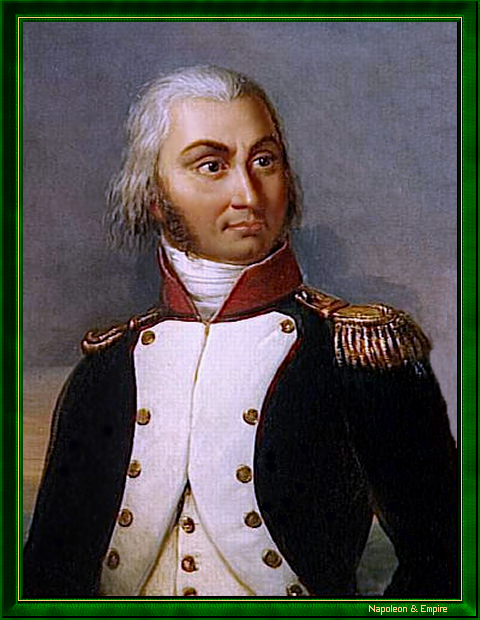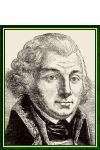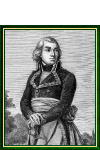Grand cordon of the Légion d'Honneur, Bavarian Order of St. Hubertus
Pronunciation:

The son of a surgeon, Jean-Baptiste Jourdan was born in Limoges on April 29, 1762. In 1778, as a silk clerk, he enlisted to fight in America (1779-1781). After returning to France and being discharged in 1784, he established himself as a haberdasher in his native town.
Captain of the local national guard, he left for the northern army after being elected lieutenant-colonel of the Haute-Vienne volunteers. He fought at Jemmapes (November 6, 1792) and Neerwinden (March 18, 1793), becoming brigadier general on May 27, 1793, and division general on July 30.
His first major successes were Wattignies (October 15-16, 1793) - a battle Napoleon Bonaparte considered the most important of the Revolution - and Fleurus (June 26, 1794). But he suffered increasingly frequent setbacks, culminating in 1796 with the defeat of Warzburg (September 3) at the hands of Archduke Charles' Austrians. The loss of this battle forced the French armies to evacuate the left bank of the Rhine. Blaming the rout on the Directoire, which Jourdan felt was incapable of providing him with the necessary means of action, he resigned and returned to his haberdashery.
A few months later (April 1797), the ungrudging electorate sent Jourdan to sit on the Conseil des Cinq-Cents. There, he pushed through a law on conscription (September 5, 1798). The principles it laid down would govern military service for almost two centuries.
Back in the army in 1798, Jean-Baptiste Jourdan successively commanded the Mainz, Danube and Helvetia armies, but was defeated again, at Stockach on March 25, 1799, and resumed his place in the Cinq-Cents. There, he became one of the leaders of the neo-Jacobins and opposed, without vigor, the coup d'état of 18 Brumaire.
This was enough to get him and sixty others expelled from the national assembly. Threatened with deportation, he obtained the intervention of General François Joseph Lefebvre, who spared him the ordeal. Napoleon Bonaparte even made him Inspector General of the infantry and cavalry, hoping to win over this democrat general.
Napoleon Bonaparte, the First Consul, and then Emperor Napoleon I, did not haggle over honors, but kept him out of important commands - their confidence in his military abilities being limited.
Administrator of Piedmont, State Councillor in 1802, Marshal in 1804, Governor of Naples in 1806, Chief of Staff to Joseph Bonaparte in Naples and then in Spain, Jean-Baptiste Jourdan fought his last battles in this country. Taken as a scapegoat by the other generals for the defeats of Talavera (July 28, 1809) and Vitoria (June 21, 1813), he was finally retired in August 1813.
Allied to the Bourbons, after the Hundred Days he presided over the council of war which declared itself incompetent to judge Marshal Michel Ney.
Louis XVIII made him a count and peer. Louis-Philippe I made him Minister of Foreign Affairs for ten days, from August 2 to August 11, 1830, to give a revolutionary flavour to the nascent July monarchy; he also appointed him Governor of the Invalides, a post in which he succeeded Victor Marie Nicolas de Faÿ de la Tour-Maubourg.
Jean-Baptiste Jourdan died in this position on November 23, 1833, and is buried in the governors' crypt of the Saint-Louis des Invalides cathedral.
"Jean-Baptiste Jourdan in 1792". Oil on canvas, begun by Julie Volpelière (Marseille 1790 - Paris 1842) and ended by Horace Vernet (Paris 1789 - Paris 1863).

Jourdan's name is inscribed on the 3rd column (north pillar) of the Arc de Triomphe de l'Étoile , while a full-length statue of the marshal by Charles Müller honors his memory on the north façade of the Louvre, rue de Rivoli .
Detailed military career
Established by Mr. Eric Le Maître, posted online with his kind permission.Wounds in action
By a Canister shot to the chest at Hondschoote, September 8, 1793.Captivity
NoneFirst engagement
Soldier at the colonial depot on the Isle of Ré, April 2, 1778.Career development
Captain, end of July 1789.
Lieutenant-colonel, October 9, 1791.
Brigadier General, May 27, 1793.
Major General, July 30, 1793.
Marshal of the Empire, May 19, 1804.
Service record
Soldier at the colonial depot on the Isle of Ré, April 2, 1778.
Auxerrois regiment, December 10, 1778.
Campaigned in America in 1779.
Returned to France due to illness, January 1, 1782.
Reinstated in his regiment, November 12, 1783.
Discharged on July 26, 1784.
Chasseurs de la garde nationale de Limoges, late July 1789.
2nd battalion of Haute-Vienne volunteers, October 9, 1791.
Army of the North, 1792-1793.
Commander-in-chief of the Ardennes army, September 11, 1793.
Commander-in-Chief of the Armée du Nord, September 22, 1793.
Removed from office, January 6, 1794.
Commander-in-chief of the Moselle army, March 10, 1794.
Commanded the armies of Moselle, Ardennes and the right of the Armée du Nord, under Pichegru, June 3, 1794.
Commanded the army reunited on the Sambre, June 8, 1794.
Commander of the Sambre-et-Meuse army, July 2, 1794.
Appointed commander of the Armée du Nord, October 8, 1796.
Elected deputy for Haute-Vienne to the Conseil des Cinq-Cents, April 12, 1797.
Passed the conscription law on September 5, 1798.
Resigned as deputy on October 13, 1793.
Commander-in-chief of the Mainz army, October 14, 1798.
Commander-in-Chief of the Army of Helvetia, November 5, 1798.
Commander-in-Chief of the three armies of Mainz (then Danube), Helvetia and Observation, March 2, 1799.
Leaves the army for health reasons, April 3, 1799.
Other portraits

Enlarge
"Marshal Jourdan". Nineteenth century etching.

Enlarge
"Marshal Jourdan". Nineteenth century French school.

Enlarge
"General Jourdan". Nineteenth century etching.

Enlarge
"Jean-Baptiste, Count Jourdan, French Marshal" by Eugène Charpentier (Paris 1811 - Paris 1890), after Joseph Marie Vien (Montpellier 1716 - Paris 1809).